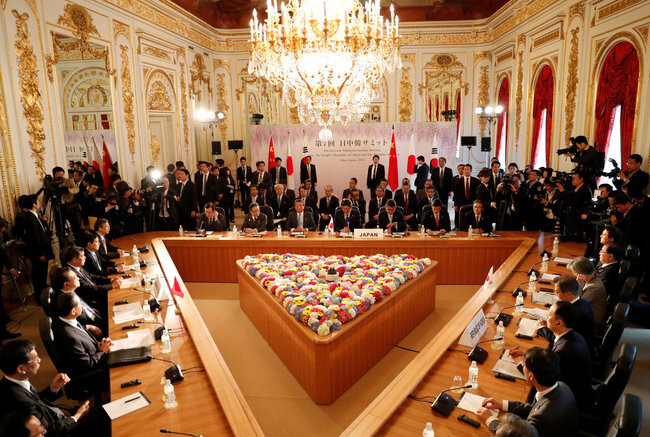hankyoreh
Links to other country sites 다른 나라 사이트 링크
South Korea, China and Japan reach late-night agreement due to differences in historical perspective

The joint declaration following the trilateral South Korea-China-Japan summit on May 9 took place late at night due to differences on issues of historical attitudes and denuclearization of the Korean Peninsula.
The summit in Tokyo began at around 10 am that day. The meeting itself lasted a little over an hour, ending around 11:20. But no joint declaration had yet emerged by the time President Moon Jae-in returned to South Korea that afternoon.
Instead, the declaration would only come late that night. Indeed, it was after midnight when the Japanese Foreign Ministry emailed the text to the foreign press.
The biggest reason for the declaration’s late arrival had to do with differences between China and Japan over attitudes on historical issues. As host country for the summit, Japan demanded a change to the reference to “facing history squarely and advancing towards the future” from the joint declaration adopted at a previous 2015 trilateral summit in Seoul. In Tokyo’s view, the language about “facing history squarely” was seen as dredging up Japan’s history of past aggressions.
According to the Kyodo news agency, the length of time was the result of China’s objections to this. Japanese news outlets reported that the differences were sharp enough that Chinese Premier Li Keqiang and Japanese Prime Minister Shinzo Abe had a direct discussion on the issue. In the end, the conceding side was China, which hopes to restore its relationship. The final declaration had the three sides “reaffirming that the three countries share everlasting history and infinite future.”
The second reason concerned phrasing on the Korean Peninsula’s denuclearization. The Asahi Shimbun newspaper reported that Japan attempted to include wording in the declaration about “complete, verifiable, and irreversible dismantlement” (CVID), which both South Korea and China objected to. This time, it was Japan that conceded. The final declaration echoes the “complete denuclearization” from the Panmunjeom Declaration following the Apr. 27 inter-Korean summit.
By Cho Ki-weon, Tokyo correspondent
Please direct comments or questions to [english@hani.co.kr]

Editorial・opinion
![[Column] Park Geun-hye déjà vu in Yoon Suk-yeol [Column] Park Geun-hye déjà vu in Yoon Suk-yeol](https://flexible.img.hani.co.kr/flexible/normal/500/300/imgdb/original/2024/0424/651713945113788.jpg) [Column] Park Geun-hye déjà vu in Yoon Suk-yeol
[Column] Park Geun-hye déjà vu in Yoon Suk-yeol![[Editorial] New weight of N. Korea’s nuclear threats makes dialogue all the more urgent [Editorial] New weight of N. Korea’s nuclear threats makes dialogue all the more urgent](https://flexible.img.hani.co.kr/flexible/normal/500/300/imgdb/original/2024/0424/7317139454662664.jpg) [Editorial] New weight of N. Korea’s nuclear threats makes dialogue all the more urgent
[Editorial] New weight of N. Korea’s nuclear threats makes dialogue all the more urgent- [Guest essay] The real reason Korea’s new right wants to dub Rhee a founding father
- [Column] ‘Choson’: Is it time we start referring to N. Korea in its own terms?
- [Editorial] Japan’s rewriting of history with Korea has gone too far
- [Column] The president’s questionable capacity for dialogue
- [Column] Are chaebol firms just pizza pies for families to divvy up as they please?
- [Column] Has Korea, too, crossed the Rubicon on China?
- [Correspondent’s column] In Japan’s alliance with US, echoes of its past alliances with UK
- [Editorial] Does Yoon think the Korean public is wrong?
Most viewed articles
- 1‘We must say no’: Seoul defense chief on Korean, USFK involvement in hypothetical Taiwan crisis
- 2N. Korean delegation’s trip to Iran shows how Pyongyang is leveraging ties with Moscow
- 3Amnesty notes ‘erosion’ of freedom of expression in Korea in annual human rights report
- 4‘Weddingflation’ breaks the bank for Korean couples-to-be
- 5[Reportage] On US campuses, student risk arrest as they call for divestment from Israel
- 6[Column] Park Geun-hye déjà vu in Yoon Suk-yeol
- 7Korea sees more deaths than births for 52nd consecutive month in February
- 8Will NewJeans end up collateral damage in internal feud at K-pop juggernaut Hybe?
- 9[Guest essay] The real reason Korea’s new right wants to dub Rhee a founding father
- 10[Editorial] New weight of N. Korea’s nuclear threats makes dialogue all the more urgent